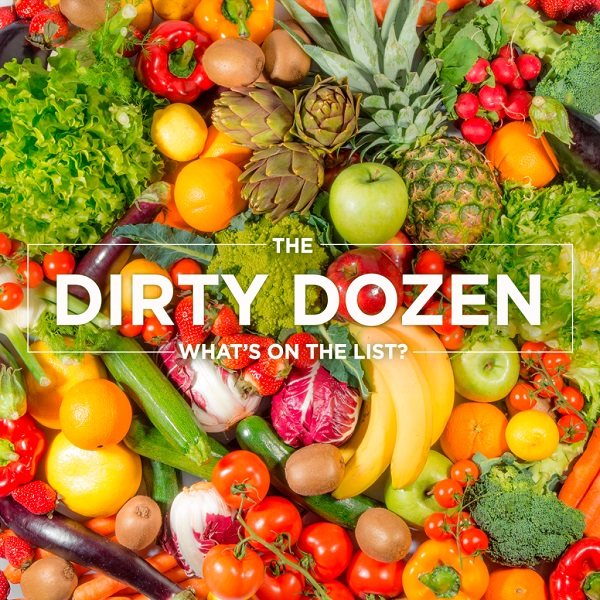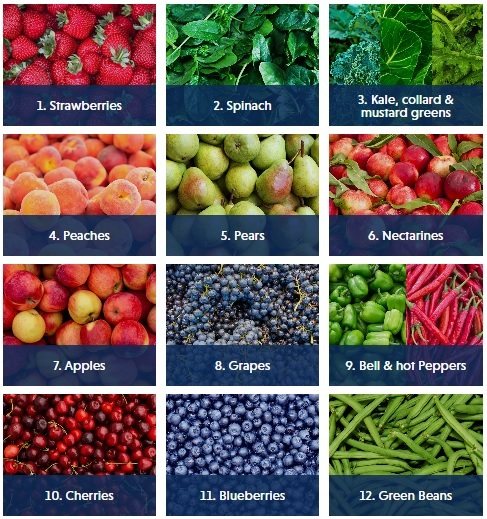
As consumers, we are becoming increasingly aware of the impact of our choices on our health and the environment. We want to make informed decisions about what we put into our bodies and the effects our choices have on the planet. This is particularly true when it comes to our food choices, especially our fruit and vegetable purchases. With the release of the Environmental Working Group Dirty Dozen list for 2023, it's time to take a closer look at how we can make healthier choices in our fruit and veg shop.
So exactly what is the Dirty Dozen anyway?
The Environmental Working Group (EWG) is a non-profit organization based in the United States that was founded in 1993 with a mission to promote public health by protecting the environment. Arguably their most famous initiative is the "Dirty Dozen" list, which was established in 1995.
The Dirty Dozen is a list of the 12 fruits and vegetables that are known to have the highest levels of pesticide residue. The list is updated annually based on testing conducted by the U.S. Department of Agriculture (USDA) and the Food and Drug Administration (FDA). The EWG analyses the data and ranks the produce based on the amount and type of pesticide residue found.
The EWG’s 2023 Shopper’s Guide to Pesticides in Produce explains “The 2023 guide includes data from 46,569 samples of 46 fruits and vegetables. The USDA peels or scrubs and washes produce samples before testing, whereas the FDA only removes dirt before testing its samples. Even after these steps, the tests still find traces of 251 different pesticides.”
The goal of the Dirty Dozen is to raise awareness about the potential health risks associated with consuming produce that has been exposed to high levels of pesticides. The Environmental Working Group encourages consumers to buy organic versions of the produce on the list, or to avoid them altogether if organic options are not available.
The Dirty Dozen have been found to contain residues of up to 230 different pesticides, some of which have been linked to serious health problems like cancers, including Hodgkin lymphoma along with hormonal disruption, neurological disorders & developmental problems in children, just to name a few!
Since its establishment in 1995, the Dirty Dozen has become a widely recognized resource across the globe for consumers looking to make healthier choices in their fruit and vegetable purchases. It has also spurred conversations about the impact of pesticides on the environment and the need for more sustainable agricultural practices. These are topics often ignored in the mainstream, but as our world population continues to grow, conversations we need to keep having.
Australia unfortunately does not have an Environmental Working Group equivalent, but as we follow many of the same agricultural practices as the US, and use largely the same pesticides for food production, it suffices as a reputable guide.
So let’s have a look at The Dirty Dozen list for 2023 in order from 1 to 12:

You can see from this list that in this years’ list 8 out of the 12 are fruits & 4 are vegetables. Green Beans and Blueberries join the list this year with alarming levels of organophosphate insecticides, known to damage the nervous system.
6% of Green Bean samples were discovered to have a pesticide known as Acephate (insecticide), banned in the US since 2011!
Kale, Collard & Mustard Greens (incl. Asians), Capsicums & Chillies had over 100 different pesticides detected in the samples!
Strawberries remain at the top of the list due to growers using frightful volumes of poisonous gases to sterilize the fields before planting, killing every living thing in the soil.
Apples are also usually near in the top of the list. Many of us probably don’t know that in the US most conventionally grown apples are drenched in diphenylamine, an antioxidant chemical treatment used to prevent the skin of apples in cold storage from developing dark patches known as storage scald. Europe has banned this chemical as it has not been proven to be safe.
So how can you use this list to make healthier choices in your fruit and veg shop? Here are a few tips:
- Buy organic whenever possible
Organic fruits and vegetables are grown without synthetic pesticides, which means they are less likely to contain harmful residues. It also means that we are putting our money where our mouth is and supporting organic farmers. The more we do this, the more the price will decrease. While organic produce can be more expensive, it's worth investing in your health and our planet for future generations. Pay the farmer not the pharmacist!
- Wash & peel your produce
If you're not able to find organic versions of the Dirty Dozen, be sure to wash & peel your produce thoroughly before eating. Soaking in an organic fruit & veg wash, bicarb soda or an apple cider vinegar bath, may also help to remove at least a small amount of the pesticide residue.
- Choose seasonal alternatives
Find seasonal alternatives to the specific item you would like. For example, if you can't find organic strawberries, try buying frozen organic strawberries instead. Often the reason they are not available organically is that they are out of season, so look for seasonal alternatives, such as organic blueberries or organic grapes.
- Buy local & organic
One way to ensure that you're buying the freshest produce possible is to support local organic farmers & small family businesses who you can trust. Not only are you supporting your local community, but you're also reducing the environmental impact of transporting produce long distances from overseas and across the country. Instead of buying imported grapes from California, support your local organic retailer.
At Wray Organic Online, we have you covered with the largest range of certified organic fruit and vegetables in Australia delivered to your door 7 days a week. Marion and Scott from Wray Organic have 16 years of retail experience in certified organic produce, and we pride ourselves on offering farm fresh home delivery. We understand the importance of making healthy seasonal choices, and we believe that everyone should have access to truly fresh, clean organic produce.
By choosing organic versions of the Dirty Dozen, washing & peeling your produce, choosing seasonal alternatives, and supporting organic local farmers & retailers, you can make healthier choices in your fruit and veg shop. With the Dirty Dozen list as a guide, you can prioritize the produce that is most important to buy organic from a health perspective. At Wray Organic Online, we are committed to helping you make the best choices for your health and the environment.
Contact us directly for more information, and let us know how we can help you stay on track with your health.
